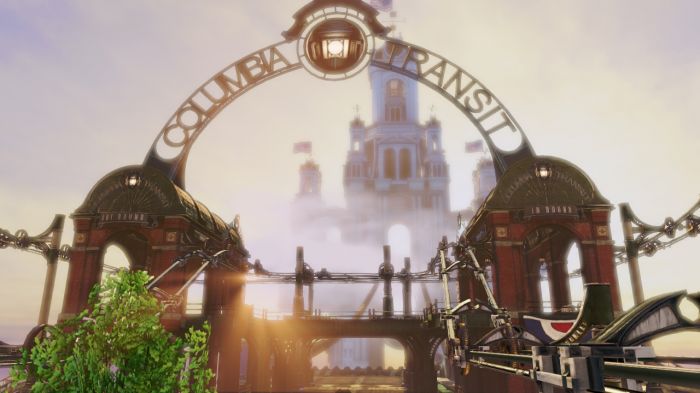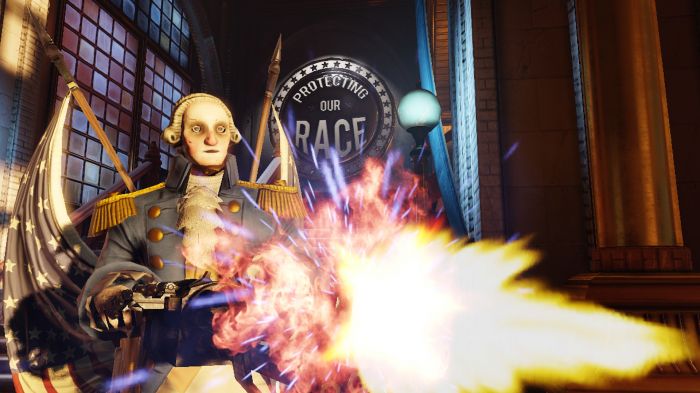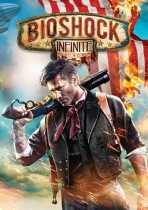
An Alternative View Of BioShock Infinite
Warning: This article contains major spoilers for the story and content of Bioshock Infinite, if you haven't already played through the game, I strongly suggest you do so first before reading ahead.

Columbia has been revealed and Comstock has been vanquished. Bioshock Infinite was finally released last week, and if you have spent just five minutes in the last few days on the internet, chances are, you have seen the glowing praise that has been heaped on Irrational Games' latest release. Booker DeWitt and Elizabeth's adventure through the cloud surfing city of Columbia easily deserves its praise, and on a personal level, I enjoyed the entire experience immensely. However, as fantastical as Infinite was to experience, there are certainly elements of the experience that fell short of perfection.
I'm at risk of being accused of cynicism for the sake of cynicism in this article, and depending on your notions of pettiness, you may be entirely justified in your accusations. Regardless of this, there are certainly genuine qualms I had with Infinite that were largely not touched on by the general press, so bear with me and hopefully you will agree that this isn't just attention grabbing opinion.
There was a massive amount of press afforded to the skyline mechanics in the pre-release previews for Infinite, with many people being impressed and in awe that a non-linear game could be welded together not by loading screens or protracted corridors but by an ingenious travel system.
Skylines were a brilliant addition to the city of Columbia, but they were by no means an integral or even necessary part of the experience. At the risk of being overly critical, at times they felt almost borderline gimmicky in the context of the overall experience. Perhaps my own expectations of how the magnetised railways were to function were simply too high or Irrational over-hyped their usefulness, but instead of being the arteries of the city, connecting each floating platform to the next, they largely consisted of looped combat aids to enable quick access to vantage points. For an element that was so heavily publicised, they felt sorely underused, just like Columbia's resident mechanical bird.

As marvellously mind-bending as Infinite's ending was, Songbird's story was never really explored or even concluded beyond the premise that he was Comstock's pet, whose sole purpose was to 'protect' Elizabeth from the 'false shepherds'' of the world. Likewise, Songbird's mannerisms and behaviour were clearly an amalgamation of the Big Daddy's from previous Bioshocks, and any audiophiles among you may have found a certain voxophone that heavily implied where he/she/it came from.
Unlike Rapture's roaming sentinels though, Columbia lacks the same combined sense of apprehension and reserved curiosity I felt when I heard the weighted footsteps of the Little Sister's overly protective surrogate parents. Unlike the two previous Bioshocks' dystopian city, Columbia's status was still on the brink of utopia, with the oppressed Vox Populi led by Daisy Fitzroy forming the opposition to Comstock's Founders.
The real story though, was the conflict between DeWitt and Comstock, and why Elizabeth was of such great importance. Because of this, the midpoint of the game, where DeWitt and Elizabeth meet Fitzroy, who subsequently sends them on a fetch quest for her, ultimately feels like a subplot rather than the establishment of the other side of the coin; the other side being the Founders.

Like Songbird, the 'heavy-hitter' enemies were undoubtedly the replacements of the Big Daddies. Although imaginative, a great deal of them (especially the Motorised Patriots) were far too frequent to ever feel particularly threatening and the Handymen, although intimidating, never really carried any sense of dread with them when they came barrelling towards me like mechanical gorillas. The Boys of Silence however, are marvellous creations, and perhaps it is the concept of a faceless enemy that I found genuinely unnerving (Hi Slenderman). A certain excellently scripted sequence involving one of these guys almost made me soil myself.
Just like how the 'heavy-hitter' class enemies replaced the Big Daddies, Elizabeth's ability to open tears in combat situations to aid Booker were clearly a replacement for the various ammo types available in the previous Bioshock games. Whilst combat was hugely enjoyable, it still felt lacking for me, and I found myself missing the ability to set up tripwire traps before a large fire-fight; instead having to rely purely on statically placed choices and far less versatile Vigors.
The story in general, whilst enjoyable, for me, felt like a slight cop-out. I had no issues with how the story was told at all (except for the minor pacing issues in the middle) or even what Infinite was ultimately about, but the final minutes of the narrative, where all was revealed, made me let out a small sigh. Not because I didn't understand the theory of a 'multiverse', but because Irrational chose the easy way out of the unresolved, vague personal interpretation of an ending that immediately conjured thoughts of Christopher Nolan's Inception.

Ultimately, the last point is largely subjective, more than the other niggles I highlighted in this article. Even so, all of the points raised here were genuine irritations that I experienced throughout my stay in Columbia. Whilst my overall experience of BioShock Infinite was a positive one, I couldn't help but think that Irrational had some staggeringly good ideas that couldn't quite escape the constraints of decrepit hardware combined with a desire for Infinite to appeal to as wide an audience as possible; by removing and simplifying certain aspects that were present in previous entries of the series that were notably absent this time around.










COMMENTS
SilentHeaven109 - 03:04pm, 18th July 2016
A lot of these points are correct and very fair. I noticed a lot of them myself, but it didn't bother me because the overall package was strong. I had the same reaction to Tomb Raider, a similarly flawed game. I do think people have been oversimplifying the ending, though. Saying "meh, it's like Inception," doesn't really do it justice. I like that it relies on personal interpretation and isn't easily digestible first time around, a rare treat in AAA videogames, today. That said, I can certainly understand why people might not like it.